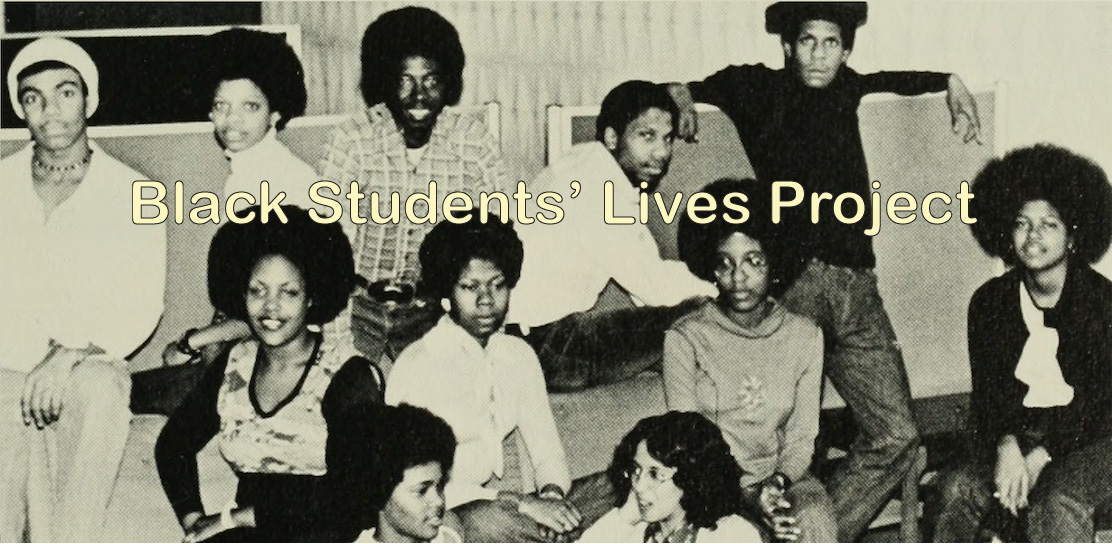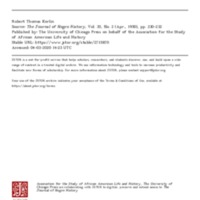Robert Thomas Kerlin Obituary
Title
Robert Thomas Kerlin Obituary
Subject
Kerlin, Obituary
Description
This obituary for Robert Kerlin appeared in the Journal of Negro History in April 1950. It recounts Kerlin's life and professional career, emphasizing his efforts on behalf of Black Freedom and against discrimination and racism.
Source
The Journal of Negro History
Publisher
JSTOR
Date
April 1950
Contributor
Randall Cream
Rights
JSTOR use can be found at https://about.jstor.org/terms/#whats-in-jstor
Identifier
https://www.jstor.org/stable/2715870
Text
RoBERT THOMAS KERLIN
On the 15th of March Robert Thomas Kerlin died at his home in
Cumberland, Maryland. He was an educator, author and reformer
of the white race. He was born at Newcastle, Missouri on March
22, 1866, the son of Thomas L. and Nancy (Jeffries) Kerlin. His
parents were slaveholders, but they were not defenders of the institution.
In the settlement of an estate they were offered additional
slaves but they refused to accept them.
Kerlin began his preparation for life at Central College,
Fayette, Missouri. He studied a year at Johns Hopkins and later
at the University of Chicago and Harvard. Finally at Yale he completed
in 1906 the requirements for the degree of Doctor of Philosophy.
In 1907 he married Adeline K. Koster of Jersey City. They
had three children : Katharine Elizabeth, Elsa Adeline, and Constance
Lee.
Kerlin began his career as professor of English at Missouri
Valley College where he served from 1890 to 1894. He then entered
upon the ministry in the Methodist Episcopal Church, South, and
served in that connection from 1895 to 1898. He next became the
chaplain to the Third Missouri Volunteers in the Spanish-American
War. After this brief service he returned to the schoolroom as a
professor of English. He did not tarry long at any of the institutions
which he served. He taught at Missouri Valley College from
1901 to 1902, Southwestern University from 1902 to 1903, and the
State Normal School at Warrensburg, Missouri from 1903 to 1906.
He functioned as instructor in English at Yale from 1906 to 1907,
as professor of literature at the State Normal School at Farmville
in Virginia from 1908 to 1910, and at the Virginia Military Institute
at Lexington from 1910 to 1921.
From this position he was dismissed for writing an open letter to
ihe Governor of Arkansas protesting the hanging of the Negro survivors
of the Elaine riot, who had merely returned the Ku Klux
Klan fire upon them in a building where they had met to improve
their status as sharecroppers. Kerlin went next to serve at the
State Normal School at West Chester, Pennsylvania where he
taught from 1922 to 1927 ; but there he showed himself such a
champion of liberal causes that conservative Pennsylvania could
not longer tolerate him. His last permanent employment as a
teacher was at Potomac State College at Keyser, West Virginia, but
there also he could not resist the appeal of liberal causes and the
cry of the down-fallen and the underprivileged. He made himself
just as unpopular at this post as he had done elsewhere and had to
retire. Yet he had served in the meantime in various capacities
elsewhere. He was associate editor of the ARENA from 1905 to
1906. He was a lecturer on English literature at the University of
Vermont Summer School from 1911 to 1917, instructor for the
American Expeditionary Force University at Beaune, France in
1919, lecturer on English Literature at the ~hiladelphia Labor
College from 1925 to 1927, lecturer at Lincoln University in 1927,
and lecturer in English literature and European History at Western
Maryland College.
In order to express himself further he wrote a number of books.
He published in 1897 a book of poems entitled Mainly for Myself.
Next came out of his experiences in the Spanish-American War
The Camp Life of the Third Regiment. His The Church of the
Fathers appeared in 1901, Theocritus in English Literature in 1909
and Milton's Minor Poems in Johnson's English Classics. Near the
end of his active career, however, the discrimination and segregation
of the Negro became the burden of his appeal for a more liberal
attitude and he set forth such views in The Voice of the Negro in
1920 to show the demands of the Negro upon the democracy of
America and the justice of their claims. He advanced the same
thought out of the mouths of the literary leaders of the oppressed
in publishing in 1923 Negro Poets and Their Poems.
The more he said in favor of the Negro, however, the more
unpopular he became with all elements of his race except the few
labor unions which accepted the Negro laborer as the equal of
others. Kerlin was really a martyr in the cause of human freedom.
Down to the very end of his career he worked hard to have the theatres of Cumberland abolish their policy of excluding Negroes.
He was especially indignant that Negroes were not permitted to
see PINKY, the moving picture based upon Negro Life in the
South and intended to improve interracial relations. Kerlin conducted
there a one-man picket line, trying to bring the managers
to terms. It may be that such exposure at his advanced age was the
immediate cause of his death.
On the 15th of March Robert Thomas Kerlin died at his home in
Cumberland, Maryland. He was an educator, author and reformer
of the white race. He was born at Newcastle, Missouri on March
22, 1866, the son of Thomas L. and Nancy (Jeffries) Kerlin. His
parents were slaveholders, but they were not defenders of the institution.
In the settlement of an estate they were offered additional
slaves but they refused to accept them.
Kerlin began his preparation for life at Central College,
Fayette, Missouri. He studied a year at Johns Hopkins and later
at the University of Chicago and Harvard. Finally at Yale he completed
in 1906 the requirements for the degree of Doctor of Philosophy.
In 1907 he married Adeline K. Koster of Jersey City. They
had three children : Katharine Elizabeth, Elsa Adeline, and Constance
Lee.
Kerlin began his career as professor of English at Missouri
Valley College where he served from 1890 to 1894. He then entered
upon the ministry in the Methodist Episcopal Church, South, and
served in that connection from 1895 to 1898. He next became the
chaplain to the Third Missouri Volunteers in the Spanish-American
War. After this brief service he returned to the schoolroom as a
professor of English. He did not tarry long at any of the institutions
which he served. He taught at Missouri Valley College from
1901 to 1902, Southwestern University from 1902 to 1903, and the
State Normal School at Warrensburg, Missouri from 1903 to 1906.
He functioned as instructor in English at Yale from 1906 to 1907,
as professor of literature at the State Normal School at Farmville
in Virginia from 1908 to 1910, and at the Virginia Military Institute
at Lexington from 1910 to 1921.
From this position he was dismissed for writing an open letter to
ihe Governor of Arkansas protesting the hanging of the Negro survivors
of the Elaine riot, who had merely returned the Ku Klux
Klan fire upon them in a building where they had met to improve
their status as sharecroppers. Kerlin went next to serve at the
State Normal School at West Chester, Pennsylvania where he
taught from 1922 to 1927 ; but there he showed himself such a
champion of liberal causes that conservative Pennsylvania could
not longer tolerate him. His last permanent employment as a
teacher was at Potomac State College at Keyser, West Virginia, but
there also he could not resist the appeal of liberal causes and the
cry of the down-fallen and the underprivileged. He made himself
just as unpopular at this post as he had done elsewhere and had to
retire. Yet he had served in the meantime in various capacities
elsewhere. He was associate editor of the ARENA from 1905 to
1906. He was a lecturer on English literature at the University of
Vermont Summer School from 1911 to 1917, instructor for the
American Expeditionary Force University at Beaune, France in
1919, lecturer on English Literature at the ~hiladelphia Labor
College from 1925 to 1927, lecturer at Lincoln University in 1927,
and lecturer in English literature and European History at Western
Maryland College.
In order to express himself further he wrote a number of books.
He published in 1897 a book of poems entitled Mainly for Myself.
Next came out of his experiences in the Spanish-American War
The Camp Life of the Third Regiment. His The Church of the
Fathers appeared in 1901, Theocritus in English Literature in 1909
and Milton's Minor Poems in Johnson's English Classics. Near the
end of his active career, however, the discrimination and segregation
of the Negro became the burden of his appeal for a more liberal
attitude and he set forth such views in The Voice of the Negro in
1920 to show the demands of the Negro upon the democracy of
America and the justice of their claims. He advanced the same
thought out of the mouths of the literary leaders of the oppressed
in publishing in 1923 Negro Poets and Their Poems.
The more he said in favor of the Negro, however, the more
unpopular he became with all elements of his race except the few
labor unions which accepted the Negro laborer as the equal of
others. Kerlin was really a martyr in the cause of human freedom.
Down to the very end of his career he worked hard to have the theatres of Cumberland abolish their policy of excluding Negroes.
He was especially indignant that Negroes were not permitted to
see PINKY, the moving picture based upon Negro Life in the
South and intended to improve interracial relations. Kerlin conducted
there a one-man picket line, trying to bring the managers
to terms. It may be that such exposure at his advanced age was the
immediate cause of his death.
Files
Reference
1950, Robert Thomas Kerlin Obituary, JSTOR


